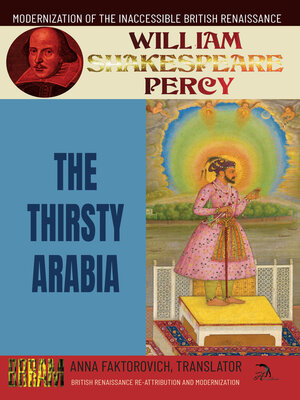The Thirsty Arabia
ebook ∣ British Renaissance Re-Attribution and Modernization, Volume 5 · British Renaissance Re-Attribution and Modernization
By William Percy

Sign up to save your library
With an OverDrive account, you can save your favorite libraries for at-a-glance information about availability. Find out more about OverDrive accounts.
Find this title in Libby, the library reading app by OverDrive.



Search for a digital library with this title
Title found at these libraries:
| Library Name | Distance |
|---|---|
| Loading... |
A closeted first attempt to present the complexities and elegance of the Islamic faith and the prophet Muhammad on the English stage. Thirsty Arabia was written over a century before the first English translation of the Qur'an was published. Despite this shortfall in primary sources about Islam, this comedy incorporates with unbiased research a wealth of theological and cultural details. Information flowed into Britain from Muslim countries alongside general trade in goods after Pope Pius V excommunicated Elizabeth I in 1570, but trade was halted shortly after this play was written in 1603. The narrative is launched when Muhammad declares he will destroy all mortals in Arabia for their sins in forty days with a drought. Muhammad's angelic council objects that there might be good people in the region worth saving, so Muhammad allows Harut and Marut to travel across Arabia disguised as humans to attempt to find any do-gooders to save Arabia. The main romantic entanglement across this plot is the unsuccessful courtship of Marquess of the Deserts Epimenides by most of the eligible bachelors, including two imams (Caleb and Tubal), the wealthy magician astrologer Geber, the two disguised angels (Harut and Marut) and Muhammad himself. While most of the characters are distracted with love, the Arabian people are dying of thirst, and fraudsters such as Çavuş work to capitalize on this desperation with tricks such as selling water-licenses. Spirits, magic, time travel and fortune telling are used to gain favor and preferment, while angels and good spirits punish evil-doers. The Aristotelian "Square of Opposition" in a logic game the angels play with Muhammad is only one of the many educational and entertaining devices. The poetic, wooing love songs, and witty refusals alone are sufficient for readers to explore the surprises along this narrative.







